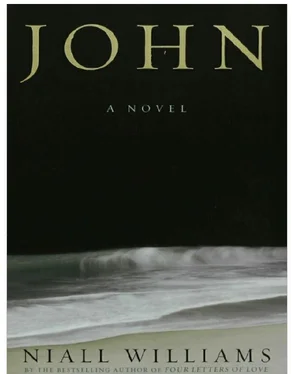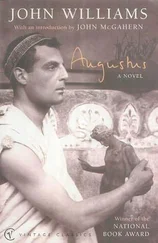'He who says he is in the light and hates his brother is in darkness even until now.
'He who loves his brother abides in the light, and there is no occasion of stumbling in him.
'But he who hates his brother is in darkness and walks in darkness, Papias, and knows not whither he goes. You understand?'
'Yes.'
'He knows not whither he goes,' he says, 'because that darkness has blinded his eyes.'
Papias looks at him. The blind face is unchanged. Never once has Papias known him to speak against the loss of his sight. Nor does he seem to here. It is strangely the opposite, as though he is the one who sees.
There are small victories. Danil reports a family of a wealthy trader who has come to believe Jesus is the Christ. Josiah on his deathbed has asked for the unction of the Holy Spirit and Eli has administered to him. With the gentle gladness of his character, Meletios tells that one Tobias wishes to take the Eucharist.
'We will go to him,' John says.
'His house is beyond the city, Master. A far distance.'
'We will leave in the morning.'
The disciples exchange looks of concern. They have come to know more closely the hostility of the city. They wish the day when Matthias appeared had not happened, and that Papias had not drawn attention to them by speaking out. They want no public. It is safer and easier if they go unnoticed, as if they are bearers of a secret faith. They are happier that the Apostle remains in the house, unseen.
'Master, the city is dangerous for you,' Danil says.
'I have no fear, Danil. We will visit good Tobias and share Eucharist with him.'
'Perhaps Meletios and I should go only.'
'Yes, two of us — or three even, say Eli — is sufficient surely?' adds Danil.
The Apostle raises his face to him. It is a face pale and calm, the skin soft with an appearance of thinness almost to translucence. The eyebrows are faint wisps of white, the eyes still and impossibly distant.
'Why do you fear? Why do you fear the world?' he asks.
'We do not fear it for ourselves, but for you, Master. The city is full of noise and commerce and pagan creeds. There are thieves, rough figures that think nothing to slit a throat and look after for the purse. We fear for you, Master,' Danil says, his thin face furrowed in earnestness.
'Why fear for me,' says John, 'when I have none for myself? I am not come to be killed in Ephesus. My brothers, look not to the world and fear. I know the world. You need not think to hide it from me. I know the time that is and what people are in it. I know all these things, and I say to you, fear not. We will go and visit Tobias and share Eucharist with him.'
They dispute no further. The daybreak following they leave. They bear with them little, but in sacking cloth an antique chalice the Apostle has since before Patmos. Their route follows the archaic processional road leading to the Temple of Artemis through the Magnesian Gate. There are groves on either side. Their footsteps are on the trodden dust of ages where in legion petitioners and worshippers have come. There are some such about them on the road. The sun is rising. Their fellow travellers consider them, this curious collection of quiet men who have not dressed in fine robes to go to beseech the goddess. What chance their prayers? Some, wealthy, borne on litters and flanked by servants, bring golden artefacts for offering, likeness of themselves, coins with brief messages stamped, busts of Artemis herself. They pass the slow-walking Christians with mild scorn, losers in the day race to the Divine. Others there are, figures in poor and ragged finery, who walk the route clutching a single coin or token, their heads low, weighted with desperation. By and large none converse with other pilgrims. All work at a private reckoning, an inner calculus whereby as they approach the portal of the gods each is already measuring how much better their world will be hereafter.
Wordless, the Christians pass on. They pass where others turn for the way to the temple. On the road, one, lame and old, hobbles towards them from the opposite direction. Shortly they come to him. When they are alongside he turns a scowl their way, then blinks quickly some sun-blindness and licks at blistered lips. He calls out.
'Strangers, stop.'
They do.
'Why do you not visit the temple? You walk past.'
'We go elsewhere,' says Danil, and turns to move on.
'The ancient one, I know him,' says the old man. 'Who are you, Ancient?'
'He is our friend,' replies Danil quickly. But John stands.
'I am John, son of Zebedee,' says the Apostle. 'How does thou know me?'
'I know thee. Though I know not how.'
'Why do you go to the temple?'
'Why, to pay homage. To give thanks, to ask for favour.'
'What favour?'
'My leg fails me.'
'How does thou know me?'
'I know thee.'
'Where have you been?'
'In the world. I am old.' The man palms the wrinkles of his brow, sweated dust. He studies the Apostle. 'In Symrna long since, you. .'
'Tell.'
The man searches in imperfect memory.
'No, I cannot. But I know that I know you.'
'We are believers in our Lord Jesus Christ,'John says. 'The Son of God, who sits at the right hand of the Father. Who will come again soon. Go not into the temple. Go home to thy wife and children.'
'Christians.'
'Yes.'
'As many I saw crucified on these very roads. There, there, even beyond there to the rise.' He points about him.
The Apostle does not turn.
'Even so,' he says, and it seems to the others gathered there that in his blindness he looks not at, but within the other.
The man blinks in puzzlement. 'How do you know of my wife and children?'
'Go in peace,' says John, 'go in the peace of our Lord Jesus Christ, who loves thee.'
'Who loves me? How loves me?'
'Verily he does. And thy wife and thy children, too.'
The man's mouth is fallen open, his brows lowered in bewilderment. He scratches his head for memories. Where was it he saw this one before? Vague clouds of mind he sifts through, tries to find the image. Was it this man he dreamt not three nights since coming to meet him?
The Apostle offers his hand. The man takes it.
Then the Christians pass on, leaving him standing so in the mystery of things, not yet aware that when they are in the distance and merest specks on the road, he will discover the strength returned to his leg, his lameness gone.
In the night they return, their spirits lifted. The moon shows through cloud. Tobias has given them good welcome and has professed his faith in Christ. They have shared in the Eucharist and feel each one a cleansed serenity, as if a white linen cloth has been unfolded in their spirits. They come back the starry way into the city.
Is it to be so? Papias wonders. Will it be one by one they win disciples to them? How long is left in the world? How long is there for sinners to repent? For the lost to find the way? The walking makes his rash burn. He lets his elbow chafe against his right side as he goes, but the relief is brief. He walks face-upward a time, looking into the stars for revelation. When the itching worsens, he fights it with prayer, amasses a legion of them, then loses to the sudden darting of a night creature crossing their road.
They come across a low place where the river water seeps out into marshy ground. Hereabouts are snakes. The thought of them, ceaselessly writhing in the soft wet dark, is enough to disband the next column of prayer. How can a man be holy in this world? How can he keep himself to higher things? Lord, help me.
They come, unscathed, through, and are back on the sunbaked ground when the moonlight is swiftly shut away. Cloud darkens all. The stars are taken as if within a fist. The road vanishes.
Читать дальше










